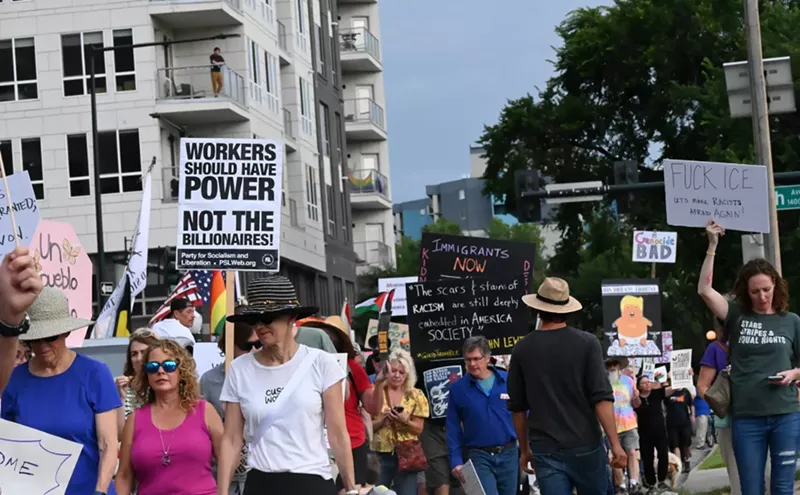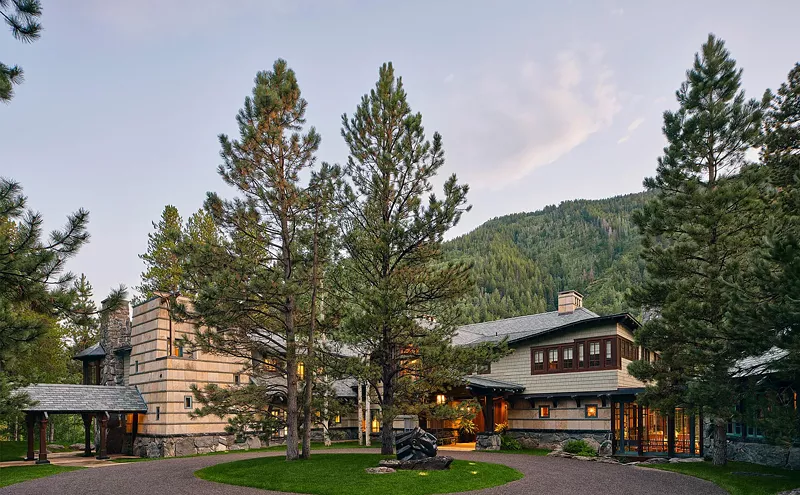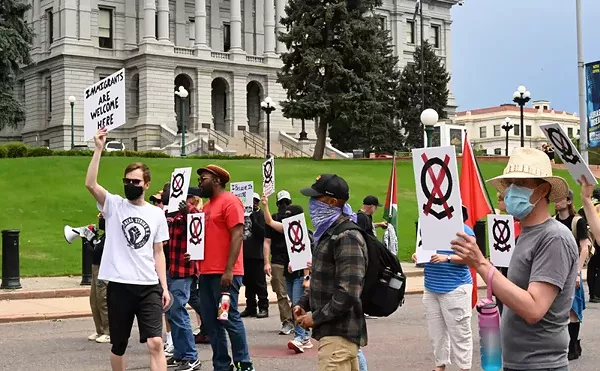Unmistaken Child, which opens tomorrow, June 26, at the Mayan Theatre, is a remarkable documentary about a fascinating ritual of Tibetan Buddhism: the search for a reincarnated master in the body of a child. Tenzin Zopa is chosen for this task after the 2001 death of 84-year-old Geshe Lama Konchog, for whom he served as an attendant for over two decades. Director Nati Baratz's camera follows Zopa over the course of several years, during which he finds a child he believes is his beloved Geshe-la come back to both physical and spiritual life -- but that's hardly the end of the story. The child must pass a series of tests designed to confirm Zopa's opinion, after which he is separated from his parents in order to begin his fulltime indoctrination into a world of tremendous rigorousness and austerity.
Earlier this week, Baratz, speaking from his native Israel, talked at length about the long road to this cinematic accomplishment. Click "Continue" to read the complete Q&A.
After offering a biographical thumbnail sketch, Baratz remarks at length about his fascination with Zopa; the obstacles he had to overcome in order to gain access to and cooperation from the faith's hierarchy; Zopa's reaction to various sequences, including one that initially left him feeling profoundly uncomfortable; Baratz's desire to share his love for the Tibetan people without omitting scenes that might cast doubt on reincarnation in general and this case in specific; his future projects; and the ways in which making the film changed him.
It'll leave an emotional mark on viewers as well.
Westword (Michael Roberts): Could you give me a little background about yourself? Where are you from originally? And what path did you take to become a filmmaker?
Nati Baratz: I'm from Israel. I studied film and television from the university twelve years ago. Before that, I was in the high-tech industry, and before that, in the army. Every Israeli must serve in the army, and I learned computers there. After I graduated from the university, well, I'm just not the type of guy that can do things he doesn't really believe in. So I didn't want to go into the TV industry. So I spent a few years in the high-tech industry as a consultant with different kinds of companies, mostly in Asia. And I did only two films, just to keep in shape. Then, in 2002, I decided it was the right time to go into cinema fulltime.
I went with my wife to Asia to look for the next project. I wanted some project that was connected to Tibet, because in 1993, I traveled there on a backpacking trip, and I fell in love with the people and their nature. I also felt a strong moral obligation about Tibet. The Tibetans were in my heart. So almost ten years later, I went there again, and I started to make another film, about Jewish Orthodox groups that were looking for a hidden tribe of Tibetan Jews. I thought it would make an interesting movie. But during the course of that, I went to Nepal. I took a course at the Kopan monastery, and I heard a lecture by Tenzin Zopa talk about the death of his master, Geshe Lama Konchog, who had recently passed away.
Tenzin talked, and his huge heart really touched me. And at the end of his lecture, he said we should all pray for the swift and unmistaken return of his master in reincarnation. And I said to myself, "This is the movie I want to make." And that is how it all started.
WW: Did you know anything about the process of searching for the reincarnation of a late master in a child? Or was this entirely new information for you?
NB: I knew the process, because I read some books. I read the Dalai Lama's autobiography. I knew about the process.
WW: So it wasn't necessarily the process itself that fascinated you? It was Tenzin and his association with that process?
NB: Exactly. For me, the whole movie started because of Tenzin. I just said, "I want to show him to people." I thought he was an amazing guy and a great hero for a film. His combination of openness and humor and faith. I thought he could carry a film, that he would be a good character to follow. For me, all the process, and everything about reincarnation, was just an excuse to bring Tenzin to the screen. The search for the child was an outline of a story that was engaging enough so that people would have enough patience to lay back and observe Tenzin.
WW: How difficult was it to convince, first, Tenzin, and later, his superiors, to allow such unfettered access to him during this period of time?
NB: The access and the confidence were the biggest challenges of this production. A few days after I thought I wanted to make the film, I went to Tenzin and told him, "I'm not a Buddhist. I don't know what to think about reincarnation. But I want to make this movie. And I have been in love with Tibet for many years." So we talked for a few hours, and he told me, "Look, it's fine with me. I think it's a great idea. But you can't just ask me." He said I had to ask one of the heads of the Tibetan spiritual leadership for permission. But he said, "You can tell him I want to make this movie." And after that, it was three or four months to get permission, and it put me in a lot of hardship. I had to travel four times back and forth to try to get meetings, and I had to be really persistent. And I think they wanted to see how persistent I was, how badly I wanted to make this movie. And they wanted to check my nature.
After I got the approval, it took another few months before Tenzin would even wear a neck microphone. Because for a monk, to be filmed.... Monks feel that they should be modest. So monks and cinema don't go together so well. So it was really hard for him. It took a few months before he really trusted me. Maybe eight months, and then there was a real bonding between us. I lived long months in his monastery, and it took a long time to get people to know me. And not only Tenzin. Everyone there.
WW: The persistence you mentioned earlier: Was that more important than any campaign you might have waged to woo them? Was the fact that you were willing to return time and again a signal to Tenzin and his superiors that your motives were pure and you weren't interested in exploiting them?
NB: That's a great remark. From the beginning, I talked to the Tibetans knowing that they are not people gifted at telling lies. And that was one of the reasons the process of finding the child was so fascinating to me, and why I wanted to be honest with them as well. I did explain to them my motivation. I even told them that I was spending so much of my own money, and they were very much worried for me. They told me, "It could take twenty years to find this child. Are you sure you want to take that responsibility?" And I told them I was willing to take all the risks if Tenzin would be with me all the way. I told them my feeling about the Tibetans, I told them I don't know what to think about reincarnation, I told them I am not a formal Buddhist. But they knew I was persistent, and they knew that I love them. And that's the strongest fuel for a filmmaker. If you really love your subjects, then they trust you.
WW: You mentioned that the process could take twenty years, but in this case, it took in the three-to-four range. Is that fast by the standards of searching for a reincarnated master?
NB: Fast? I think two to three years is average. But sometimes they don't find the child. Sometimes it takes twenty years, and sometimes they don't find the reincarnated master.... Regarding your previous question, though, I feel I didn't give you the complete answer.
WW: Please, go ahead.
NB: I guess you're wondering why they wanted me to make this movie, and why they allowed me to go into the most intimate religious rites. I talked to them from the beginning, and told them that if I am putting in all this effort and all this time, I wanted to make a commercial film, and a film suitable to be seen by non-believers as well as believers. And as I told you, I was completely honest with Tenzin from the very beginning. Maybe that's what made the bonding between us, because over the course of time, Tenzin found out that he could trust me. I was putting in all the effort I promised. But I'm sure Tenzin would have made a different film. Tenzin went with me to the Berlin Film Festival. He was with me during the Q&As and we had long talks. We spent a week together. And of course, he would make a completely different film.
Tenzin's film would be much more religious, much more holy, he would talk much more about his master. And in my film, I really tried to make the audience contemplate and think rather than just experience. In my film, I show both sides. In one scene, the child is holy, and in the next scene, he is a regular child. This was done deliberately to force the audience to think for themselves and develop their own ideas about what is happening. Tenzin would not make a film in that way, but he respected me enough, and was open enough, to understand why I did it. I wanted the film to be more accessible. And from the beginning, he thought the film was a good idea for two things. He wanted people to gain understanding of reincarnation. And he told me, if one person came to believe in reincarnation because of the film, it would be worth all the effort. And secondly, he wanted for people to know his master through the film. So it was sacrificing his modesty and letting me into his life just saw that people would honor him.
WW: There's a moment when Tenzin breaks down crying when he visits his master's old home, which is an incredibly moving moment. After seeing that moment on the screen, did Tenzin have any regrets about being as open with you as he was? Or did he have complete trust in your use of that kind of material?
NB: It's interesting, because I showed him that footage much before I started the final editing. I thought, this is a key thing he should approve. And his reaction was, "It's not good for a monk to cry. Monks should cry out of compassion and not out of attachment and missing his master." But then he thought and told me I could use it. And after one year, he told me I didn't need to show him anything else, because it's my movie and he trusts me. So when I finished editing, I sent him a copy, and he didn't watch it because he was in retreat. He told me, "I will watch it after the retreat." And I said, "That will be too late if you have any remarks." And he said, "Then that's okay. I trust you. It's your film." And then he finally saw the film, and I think you will never guess the thing that disturbed him. One thing he didn't like. Try to guess, please.
WW: The one I would guess is the scene where the parents leave and the child is distraught because he feels like he'll be alone.
NB: "And now I have no friends:" yes. No, that was the thing I was uncomfortable with. But the only thing Tenzin was uncomfortable with was the scene with the Dalai Lama. Because the Dalai Lama offered the child the white scarf, and the child refused to take it and tried to put it on the Dalai Lama himself, which is considered very impolite. It's like saying to the Dalai Lama, "You don't give me an offering. I will give one to you." And I knew this, but I could not cut it. The scene was important. And after seeing the film three times, Tenzin told me, "Look, people laugh, and it's only a movie, and it's okay." He could live with it.
Tenzin is a really smart guy, and the only thing I'm sorry about in this film is that I couldn't give the audience as much of a chance as I would have liked to see his intellectual qualities. Because he's a doctor of Buddhist philosophy, a very young one. You'll see it in the extra scenes in the DVD. He's really open-minded, and he always thinks of the benefits of things. He looks at the movie and ignores himself and thinks about how it will affect others. You have to choose the right hero for a documentary, and I think I did.
WW: You mentioned that you included scenes in which there were indications that the child might actually be the reincarnated master and other scenes in which he seemed like a normal child. In the segment in which he chooses among different items that once belonged to the late master, he seemed to unerringly pick the right ones. Was that actually the way it happened? Was there really no editing involved?
NB: No, no, that was how it happened. But it all depends on the viewer. Some viewers, this didn't convince them. What you see is how I experienced it. I can never say, "This is the reality," because I filmed it. This is just how I perceived it.
WW: The scene I mentioned earlier, in which the parents leave the child, was emotionally devastating to watch. Was that a moment when you were torn between a filmmakers excitement over capturing this remarkable footage and the average person's feeling that you're intruding on a private moment?
NB: I think this was the only scene where I felt I shouldn't be there. And I was there alone, by the way. I filmed it myself. It was very hard, but I remember thinking, "You've been here all the way. This is maybe going to be one of the last scenes in the movie. Film it and later you decide if it's for the benefit of the film, or if you should not use it." And I consulted with Tenzin, and we discussed it after. I explained to him my motivations for using this scene. And Tenzin told me, "Even from a Buddhist point of view, it's fine. Because he's still a child." He said the mindstream that passed from one to the other is not the brain. It's something very subtle. We only see it when we practice enough, and only when we understand the true nature of things, then we can see this mindstream. So he felt that in the emotional structure of a child, this was fine. It wasn't proof that he didn't have a true Buddhist nature.
And since this concept was very deep, Tenzin wanted to show it. He wanted to show that it's not easy to become a lama, you know? Some people think it's great for the family that their son is chosen to be a lama. He gets such honor and the family gets a lot of money and respect. But you've got to understand, it's difficult to go through that. That was his point of view. My point of view was to really force people to think for themselves. The whole idea of making this film was to expose people to a different point of view, a different culture, to really challenge their ideas. And this scene comes right after a ceremony that is very uplifting. You have maybe the most uplifting scene, and then maybe the most down scene. It raises a lot of questions, and that was the intention.
One of the things that challenges people is that they take the baby. If you read the New York Post review, he gave the movie a very good review, but the review starts like this [paraphrasing]: "I want to report a child-abuse case. A young man dressed in robes took a child...."
WW: After you'd completed the film, did you feel that making it had changed you? And if so, how were you changed?
NB: You know, this film took five-and-a-half years to complete, and in the thick of the filming, I even moved with my wife and two-year-old daughter to India for a year to be close to the shooting, to the happenings. Because one of the tricky things was, I couldn't raise money, because I promised them that I would keep everything a secret. So I had to self-finance the movie. And being there five years with Tenzin.... It wasn't constant, but if you put all the time together, it was almost a year of being together. On the road, in tents, at the monastery. At some points, my daughter would be playing with the reincarnated child. We were just living with them at that time. So being with Tenzin is constant teaching.
If I have to think of two things, I would say the most important thing I learned is acceptance. To not blame any external thing, and to blame only myself, and accept reality. This is one thing I really learned, thoroughly learned. At one point, I waited in the thick of the mountains for an interview. And when I reached him, he told me, "You know what? Let's not do it this time. Let's do it next time." And I came specially from Israel with 200 KGs of equipment. If I hadn't been with Tenzin for three years at that time, I would have said, "What are you talking about?" But because I had experience with them, I just laughed and said, "Maybe next time." And maybe it was for the best, maybe not. But the next time I came to him, he took me by the hand and walked with me around the monastery and showed everyone that they could trust me, and we did the interview. So the experience taught me to accept reality. It's a very important lesson for life, and especially for documentary filmmaking.
And secondly, I would say I learned about capacity. Being with Tenzin, he does so much. He works twenty hours a day. He never says "no" to anyone. He always helps anyone who asks him to do things. He has so many projects, and still in the midst of all this work, he's memorizing thirty pages of prayers at night, at 2 a.m. Every day. It's amazing. So when you're around someone who works so much, it has an affect on you. And I learned many other things. I learned to respect other cultures. As much I learned, it made me realize how little I know. I just hope I learn as much on my next project as I learned in this one.
WW: Have you decided on that next project?
NB: Yes, I have two projects. One will talk about globalization and resource distribution in the world in a very personal and dramatic way, by showing personal stories all around the world connected with food. And in the end, they will all come to a fancy restaurant in New York. This movie will share my feelings about unfair distribution of global resources. It's very personal for me, so I really want to share this feeling, and I hope the movie will do it. And the other project I have is connected with death. I want to show different people in different cultures dying. To show different ways of dying. We know how to live, but we don't know how to die.












